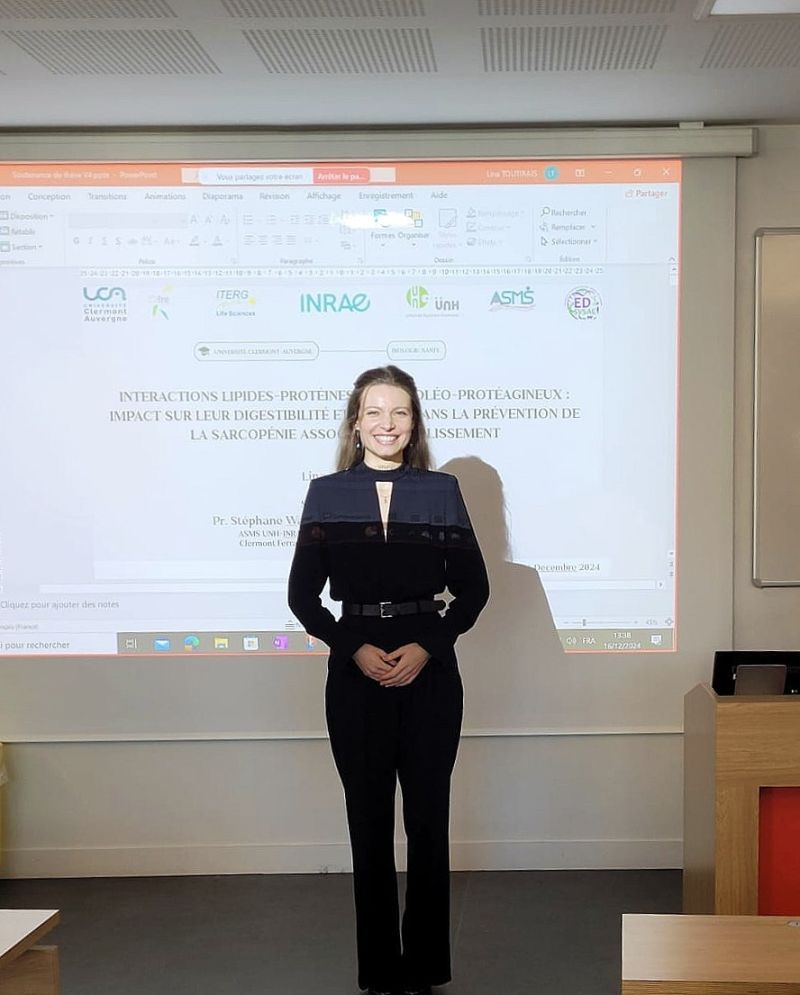Summary of the thesis in :
Lipid-protein interaction from oilseeds: impact on their digestibility and interest in the prevention of sarcopenia associated with aging
Currently, the demand for dietary proteins is high and is expected to increase over the next decade due to global population growth. Limited resources and the ecological impact of animal protein production have led to an increase in plant-based dietary approaches. Protein ingredients from oilseeds, which are generally present in the animal feed market, could emerge as a new protein source for human nutrition. Oilseeds offer dual nutritional benefits by providing both proteins and lipids rich in polyunsaturated fatty acids (PUFAs). However, a better understanding of the nutritional value of proteins derived from oilseeds is needed before they can be recommended for human consumption, especially in situations where protein needs are increased, such as in the elderly. In this population, sarcopenia is a condition defined by the loss of muscle mass and muscle function, associated with a negative net protein balance. It can be prevented by increasing the intake of high-quality proteins and PUFAs. Being rich in these nutrients, oilseeds could play an important role in preventing sarcopenia.
This thesis project aims to evaluate the nutritional value of proteins from oilseeds by examining the interactions between lipids and proteins and their impact on digestibility. Subsequently, the potential of these proteins to limit age-related sarcopenia was explored.



The findings confirmed that, unlike sunflower proteins, which are deficient in lysine, the amino acid profile of rapeseed meets human nutritional requirements for essential amino acids. The in vitro digestibility of rapeseed and sunflower proteins is comparable to that of pea protein, highlighting their nutritional potential. The addition of lipids to oilseed protein matrices had varying effects on in vitro protein digestibility, depending on the composition of the matrices. Specifically, lipid addition improved protein digestibility, especially in protein-concentrated matrices low in constitutive lipids, starch, and fiber. However, the lipid digestibility of rapeseed oil was reduced when protein matrices were incorporated. These results suggest the promising nutritional potential of oilseed proteins but need to be confirmed in vivo.
The in vivo study conducted in aged rats showed that apparent nitrogen digestibility, biological value, and net protein utilization were not significantly different between sunflower proteins, casein, and pea proteins. Consequently, muscle synthesis and degradation, as well as muscle mass, were equivalent after the consumption of these three protein sources. However, lipid metabolism appeared to be disrupted by a diet based on sunflower proteins, leading to intramuscular accumulation of free fatty acids and diacylglycerols, as well as an increase in fat mass. This dysregulation could reflect a reduced capacity to oxidize fatty acids in peripheral tissues, thus promoting lipid storage and fat mass gain. Finally, an increase in omega-3 PUFA incorporation into the plantaris muscle was observed after two months of a diet rich in alpha-linolenic acid, without affecting muscle protein metabolism.
Thus, proteins derived from oilseeds, particularly rapeseed and sunflower proteins, are emerging as promising sources for human nutrition. Their digestibility and beneficial effect on muscle protein metabolism, comparable to that of pea and casein proteins, make them interesting candidates as new dietary protein sources.
This defense took place on Monday, December 16, 2024 at 2:00 pm.
Address : Faculté de médecine. 28 Pl. Henri Dunant, 63000 Beaumont – salle 6B
The jury is composed of
| Stéphane WALRAND | University Professor – Hospital Practitioner | University Clermont Auvergne | Thesis Director | |||
| Claire GAUDICHON | University Professor | AgroParisTech, Université Paris-Saclay | Rapporteur | |||
| Carole VAYSSE | Doctor | Iterg | Thesis co-supervisor | |||
| Jean-Michel CHARDIGNY | Research Director | Innovation Partnership and Transfer Department – INRAE Paris | Rapporteur | |||
| Steven LE FEUNTEUN | Research Associate | Institut agro Rennes Angers | Rapporteur | |||
| Véronique SANTé LHOUTELLIER | Research Director | INRAE Theix | Examiner | |||
| Marine GUEUGNEAU | Research Fellow | INRAE, Université Clermont Auvergne | Examiner | |||
| Yves BOIRIE | University professor – hospital practitioner | University of Clermont Auvergne | Chairman |
